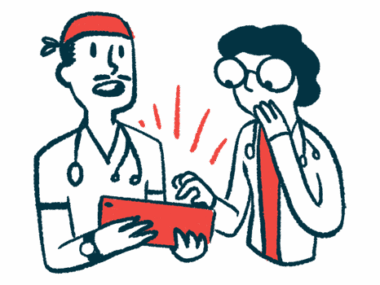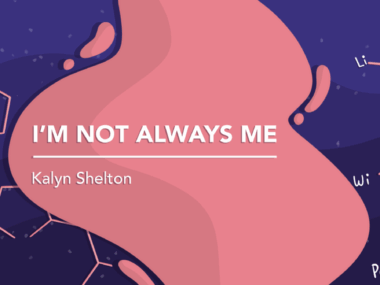I Live With Acute Porphyria, and I Am Tired
Written by |

I can describe chronic fatigue, but it’s impossible to understand unless you’ve experienced it. It’s feeling exhausted from your morning shower; it’s falling asleep every time you crack open a book; it’s feeling too weak to pick up the watering can in the garden; it’s feeling more tired after a nap than you did before.
Sometimes I sleep for 12 hours and wake up ready to go back to bed. I spend those days in a zombie-like haze. I float around, but it’s as if there’s a slow leak in my raft. Regardless of how long I pump it up, it will never inflate completely. I might stay above water for a while, but it will always need more air.
Earlier this year, I was diagnosed with hypersomnia, a sleep disorder that explained my excessive daytime tiredness. Hypersomnia is common for people living with chronic conditions like acute hepatic porphyria (AHP).
Sleep is my only option, but getting more doesn’t correlate directly to feeling rested. It’s as if my battery maxes out at 60%. My chronic fatigue reality is misunderstood, even by those I hold most dear. Here’s an example of a conversation I have regularly:
Well-meaning friend: “How have you been feeling?”
Me: “It’s been a struggle lately. I slept 11 hours last night and it wasn’t enough.”
WMF: “Eleven hours? Wow, I haven’t done that since college!”
Me: “I don’t think you under—”
WMF: “Boy, I’d like to sleep for 11 hours.”
Me: [audibly sighing]
It hurts when loved ones have trouble empathizing, and I have to remind myself they can’t truly understand what it’s like.
A history of sleepiness
Chronic fatigue is a cruel master. For years, it’s held my body hostage with lethargy, weakness, or excessive sleepiness, depending on the day. I blamed anxiety and an inconsistent sleep schedule. I resisted seeking care for my chronic fatigue, and I had so many excuses.
I reasoned that once I got hold of my insomnia, my daytime sleepiness would improve. Then, I hoped regular treatment for AHP would help. Eventually, I normalized my poor stamina and day-to-day exhaustion, accepting that it was part of life with rare disease. Silencing my body and minimizing my symptoms is kind of my thing — I did it with chronic migraines and with AHP before that.
A turning point occurred this spring, after emerging bleary-eyed and wild-haired from a five-day stretch of near constant napping. Depressed and still encumbered by exhaustion, I realized chronic fatigue was stealing my life, my joy.
I couldn’t truly enjoy low pain days, because I had no energy. This was more than needing more sleep. This was a deep pull. Chronic fatigue was an anchor I lugged around, a suffocating cloak of exhaustion weighing down my shoulders. Some days it was heavier than others, but it was always there.
Treatment for chronic fatigue
I added chronic fatigue to a short list of concerns and enlisted the help of my trusty primary care physician. She referred me to a sleep specialist, but my expectations were low. I am wary of new providers who’ve never treated someone with AHP. I feared that instead of learning about my rare disease, she’d tell me to just try yoga.
She didn’t. Turns out, I’m not that special. She was familiar with chronic illness and the resulting fatigue. After our initial telehealth appointment, I felt validated and heard. Moreover, I felt hopeful that things could improve. I participated in a daytime sleep study, which confirmed my diagnosis.
There are treatments for hypersomnia, although many are not listed on the porphyria safe drug database. My specialist consulted with a porphyria expert, and together they identified a prescription called Sunosi (solriamfetol). Better still, my insurance agreed to cover it, despite a comparatively higher price tag. A month and a dose increase later, Sunosi has noticeably improved my quality of life. It’s the closest I’ve come to patching my raft.
I’m still ruled by my chronic fatigue some days, but overall enjoy a significant increase in usable hours. My hypersomnia diagnosis has been a gift. Naming my condition helped remove shame and guilt that comes with needing extra time in bed or spending daytime hours on the couch.
***
Unless we’re on vacation or deathly ill, society pressures us to keep busy and work, work, work! In the United States, we are so bad at relaxing that there’s a day to celebrate laziness on Aug. 10. So today, in honor of National Lazy Day, I invite you to kick back and relax with zero guilt.
And for those of you living with chronic fatigue, here’s a gentle reminder: Resting your body without feeling guilty is an option any day of the year. Our bodies and brains work hard. When they need a break, I can’t think of a better reason to take one!
***
Note: Porphyria News is strictly a news and information website about the disease. It does not provide medical advice, diagnosis, or treatment. This content is not intended to be a substitute for professional medical advice, diagnosis, or treatment. Always seek the advice of your physician or other qualified health provider with any questions you may have regarding a medical condition. Never disregard professional medical advice or delay in seeking it because of something you have read on this website. The opinions expressed in this column are not those of Porphyria News or its parent company, Bionews, and are intended to spark discussion about issues pertaining to porphyria.







Aspsusa
The way you describe that fatigue really resonated with me. I've always blamed it on not sleeping well (or sometimes just depression and ADHD/aut - spectrum weirdness). Never really made any connection to my hepatic porphyria. It is interesting that you don't either, at least not overtly.
Lately though I've started to wonder about that, since my sleep irregularities have been better managed and this "leaking raft" and "being too weak to pick up a watering can" have become more episodic, rather than tied to mood or just not getting enough sleep (and enough LIGHT).
Maybe also because with having access to a stimulant (plain methylphenidate) I have become better at discerning what is what - the stimulant can temporarily "patch the raft", but both with and without it there are "on" and "off" days. (With a hepatic porphyria I have to be extremely careful about diet with a stimulant, one of the many reasons it is not a very ideal medication.)
What has always baffled me with my tiredness or inability to get mundane things done has always been that usually it is not at all amenable to "just doing it" or forcing myself. And then sometimes it is, and without consequences (ie being really out of it for the next days)!
Reading about your fatigue symptoms, and on a porphyria-site has given me much food for thought, thank you!
Claire Richmond
Hi Aspsusa! Thanks for sharing your story, it has given me food for thought as well. I can relate to the inconsistent pattern of fatigue and how it doesn't always associate with my activity. It's confusing! We can't really apply a "spoon theory" to this kind of unreliable exhaustion response. I've never talked to anyone else who's shared this fatigue pattern! Thank you for reading and for your comments. - Claire